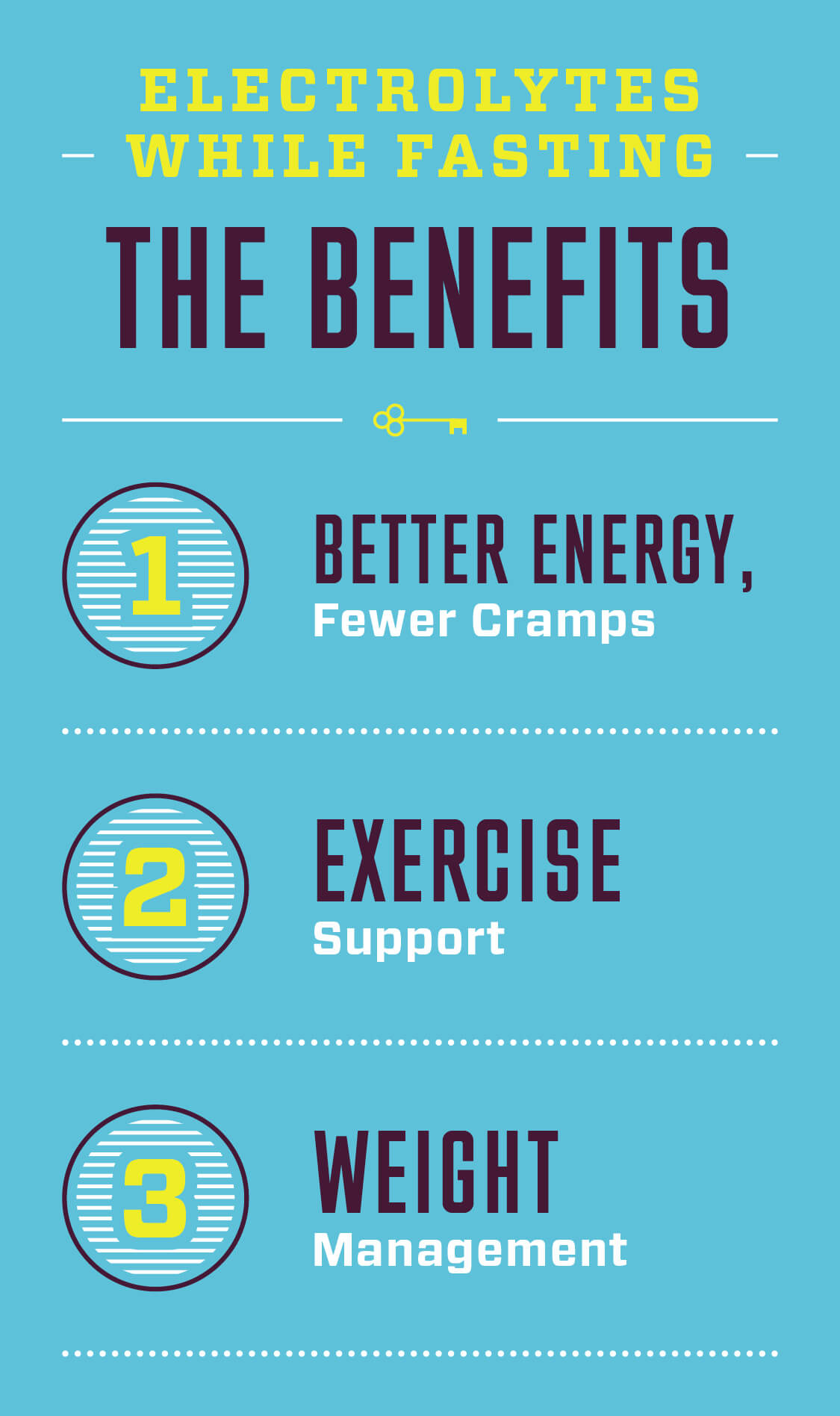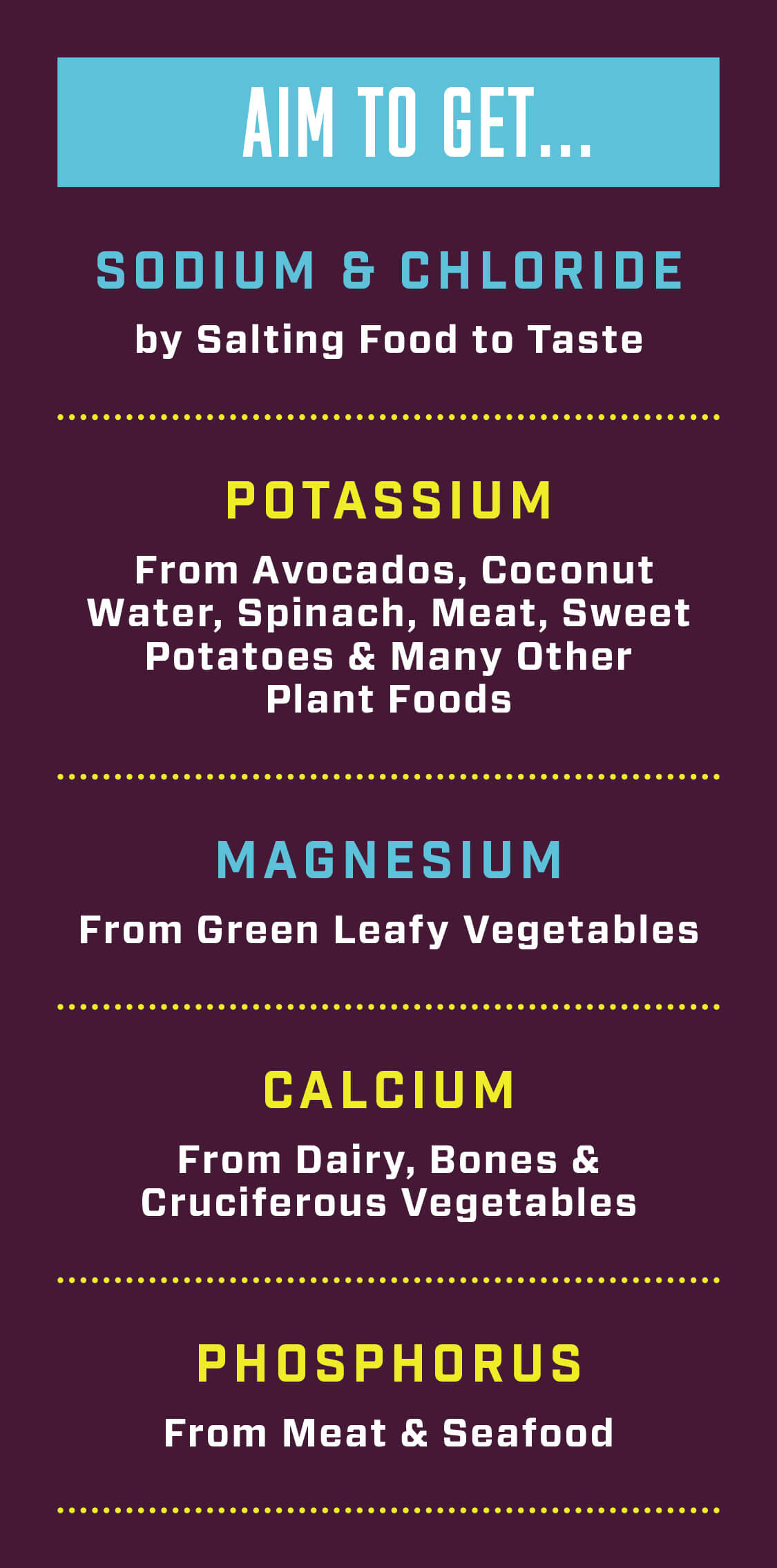
Do You Need Electrolytes While Fasting?
Share
Medically Reviewed by Dr. Bryan Seigel D.C., P.L.C.
What’s the biggest mistake people make while fasting? They neglect electrolytes. And neglecting electrolytes makes fasting much harder than it needs to be.
Fasting can be tough to begin with. If you’ve dabbled with intermittent fasting, you’ve probably had some ravenous moments.
Getting hungry while fasting is like driving home during rush hour. No matter what route you take, you’re going to hit traffic.
You can handle hunger, but not so much the low-energy, headaches, and muscle cramps that often accompany a fast. That’s where electrolytes come in.
Electrolytes 101

Electrolytes aren’t called electro-lytes by accident. These charged minerals conduct electricity in your body, supplying your nervous system with the raw materials needed for nerve-to-nerve communication[*].
But electrolytes aren’t just about electricity. Along with building bone, contracting muscle, and structuring energy, they also regulate fluid balance[*].
Fluid balance means hydration status, or the balance of water and electrolytes inside your body. Fluid balance affects blood pressure, blood flow, muscle function, mood, and energy. Electrolytes keep this system tuned like an Italian sports car.
The main electrolytes are sodium, potassium, chloride, magnesium, calcium, phosphorus, and bicarbonate. You consume sodium and chloride together as salt, and the other electrolytes from dietary sources. The exception is bicarbonate, which your body synthesizes[*].
You lose electrolytes through sweat, feces, and urine. Of the three, urine is your chief electrolyte officer (CEO). It’s the medium by which you maintain fluid balance. For instance, if you consume too much sodium, your pee will get salty as you dispose of the excess.
Normally, this fluid balancing act works well enough on its own. But fasting can change things.
Why You Need More Electrolytes While Fasting
There are two reasons you need more electrolytes while fasting:
- You lose more electrolytes in a fasted state
- You consume fewer (or zero) electrolytes during a fast
The first reason requires some explanation. When you fast, you trigger a series of metabolic changes that ends with you burning more fat. As these changes settle in, body fat gets released, split apart, and burned in the liver for energy.
These changes, however, have consequences unrelated to fat-burning. Namely, they make you lose more water and electrolytes.

Losing water during a fast is called diuresis, and losing sodium is called natriuresis. You also lose potassium[*]. For the most part, these losses can be traced back to insulin.
When you fast or eat a ketogenic diet, your insulin levels fall. (Insulin is the hormone that handles blood sugar, aka carbs). Low insulin, in turn, tells your kidneys to start expelling water and sodium like juvenile delinquents from an overbooked prep school[*].
The research bears this out. Since the 1970s, scientists have known that fasting provokes water, sodium, and potassium loss through urine[*]. And in one 1988 study published in the Journal of the National Medical Association, giving folks an electrolyte supplement kept their electrolyte levels stable during a period of rapid, fasting-induced weight loss[*]. Without supplementation, you typically see severe electrolyte disturbances in these situations.
To be clear, however, these were folks fasting for days, not hours. Shorter, intermittent fasts will have similar (though less pronounced) effects.
The second reason you need more electrolytes while fasting? Your diet, of course. If you’re not eating food—even for short intervals—you’re likely consuming fewer electrolytes. This can be remedied through supplementation. More on that later.
Electrolytes While Fasting: Benefits

You just learned how fasting increases the risk of electrolyte deficiency. You’re eating fewer electrolytes, excreting more electrolytes.
Electrolyte deficiencies, unfortunately, can impede your health, happiness, and performance. The effects are often subtle. You know something is off, but you can’t put your finger on it.
That something is low electrolytes, and fixing it can help. Let’s review the main areas of benefit.
#1: Better energy, fewer cramps
If you’re not getting enough electrolytes, you’re guaranteed not to feel your best. Consider the following:
- Sodium or potassium deficiency can cause headaches, fatigue, and muscle cramps[*].
- Magnesium deficiency can cause muscle cramps, headaches, mood problems, and bone density issues[*].
- Calcium deficiency can cause cramping and bone density issues[*].

Often, people attribute their fasting malaise to a lack of calories. The real problem, however, is insufficient electrolytes.
#2: Exercise support
When you exercise, you lose electrolytes through sweat. If these electrolytes aren’t replaced, muscles will cramp, performance will suffer, and recovery will stall.
It’s crucial to support fasted training with electrolytes. When you train fasted, you’re already at higher risk for electrolyte deficiency. Sweating only magnifies that risk.
#3: Weight management
Many people pursue intermittent fasting to lose weight. The strategy often works, since compressing the feeding window tends to decrease the overall amount of insulin released[*]. When you forgo the midnight snack, you forgo empty, insulin-spiking calories that are easily stored as fat.
Keep in mind, however, that initial weight loss from fasting isn’t usually fat loss, but water loss. That’s your body chewing through stored glucose (called glycogen) on its way to becoming a fat-burning beast[*].
When you eat again, some of this glycogen reforms, adding back water weight. Research suggests, you’ll want to know, that taking electrolytes dampens this weight rebound effect[*]. Cool factoid.

Taking Electrolytes During a Fast
Want to optimize your fasting electrolyte status? Follow these two principles:
- Eat electrolyte-rich foods during feeding windows.
- Supplement wisely.
Following the first principle means taking stock of your diet. Are you getting enough electrolytes? Aim to get…
- Sodium and chloride by salting food to taste
- Potassium from avocados, coconut water, spinach, meat, and sweet potatoes, and many other plant foods
- Magnesium from green leafy vegetables
- Calcium from dairy, bones, and cruciferous vegetables
- Phosphorus from meat and seafood

Beyond dietary sources, consider supplementing. The trick is to find an electrolyte supplement that covers all your bases, tastes great, and won’t break your fast. It should have no sugar, no calories, or artificial ingredients. No junk whatsoever.
If you’re on the search for such a product, we humbly recommend Electrolyte Recovery Plus.
It’s the simple solution to the number one mistake people make while fasting. Are you taking advantage?

